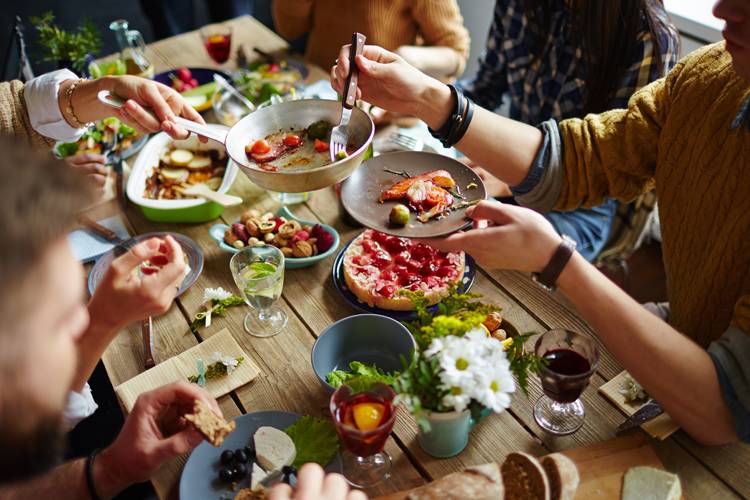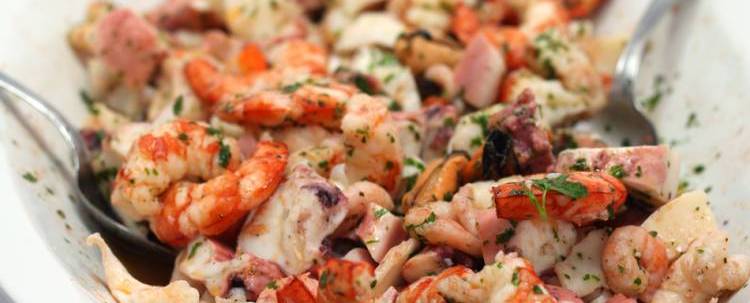Digestive Christmas: learn to enjoy without exces
Stomach-ache, constipation, gas or heart burn is everyone’s Christmas nightmare. The excesses take their toll, and losing control doesn’t just result in putting on weight or feeling bloated for a few days, but you’re also damaging your digestive system.
health and beauty
Share

Christmas is a time for celebration and family reunions, but it also means days of eating and drinking ourselves silly. However, there is a solution to the situation, if you want to find it.
Seeing the year out feeling good about your body is easier than you think. Follow these tips and you’ll see for yourself that Christmas is not synonym of bloating and stomach-ache. The key is to take care of some details of your living habits and diet.
AFTER HOLIDAYS... REBALANCE YOUR PH
With Christmas feasts, your organism suffers a pH imbalance due to the increase in acid levels in the blood caused by excess protein and fat. The body tries to neutralise the acid and restore appropriate pH levels to the blood, and to do so ‘steals’ nutrients from other vital organs. When this happens, your body becomes weaker because it needs more nutrients. This is why you feel tired and have digestive problems.

Detoxifying your body after Christmas is essential. To do so, eat alkaline or base foods, that is, food that is not acidic and which contains minerals such as calcium, magnesium and potassium, essential to restore the blood’s pH balance. Among the most alkaline foods there are:
• Leafy greens (lettuce, spinach, chard): these are powerful antioxidants and also contain vitamin A, which strengthens the immune system, vitamin C and calcium.
• Lemon: a glass of lemon water before breakfast helps you to eliminate toxins accumulated during the night, and if it is warm water, it is a powerful remedy for constipation. Despite its acidic taste, lemon has an alkaline effect on the body.
• Ginger: this is the best ally for sickness and nausea. It helps the metabolism with digestion and to relieve an upset stomach. It can be taken in an infusion or powdered in cooking (broth, purée…). It is also a source of magnesium, which helps to reduce tiredness and fatigue.
• Papaya: rich in fibre and aids intestinal transit. You can eat it in several forms: in salads, fruit salads, as juice…
• Avocado: has a very high nutritive value (folic acid, potassium, oleic acid, fibre, vitamins A, C, E…).
• Green tea: a powerful antioxidant. It also helps to keep slim and is a good ally of the digestive system, as it reduces gas and constipation.
• Broccoli: This is one of the foodstuffs with most Vitamin C, high anti-oxidant effect and rich in fibre and folic acid.
• Artichokes: These are diuretic, purifying and satiating as well as a source of potassium and fibre. They are highly versatile for cooking as you can include them in your rice dishes, cook them on the hotplate and even put them in your omelettes and infusions.
• Celery and cucumber: Celery is a very healthy food with low energy value and cucumber is one of the vegetables with greatest water content, meaning that it also provides very few calories. Both can be eaten raw.
• Bimi: An excellent green vegetable for including in low-calorie diets. Its salient feature is its sweet and mild taste. Rich in vitamin C and fibre.
• Kale and Bok Choy: These belong to the cabbage family, meaning that they are a source of fibre. Kale is considered to be a superfood, while bok choy is very low in calories and especially good in fast sautés, in the wok or steamed.”
TIP
Experts do not recommend drastic diets after Christmas. It is better to return to your usual diet so that your metabolism does not suffer sudden changes and end up with no energy.
DON'T FORGET TO...
• Exercise: although you’ve got some days off, your body needs to move to work off excesses. You might not have time to go out for a walk or run on Christmas Eve or New Year’s Eve, but you can make the most of days off between celebrations to keep fit. You have to avoid typical Christmas laziness. Going for a walk for 30 minutes a day is enough to keep up your exercise routine.
• Go to bed later than usual if you have eaten a lot for dinner: for example, n Christmas Eve dinner you eat and drink more than what your body is used to and then you go to bed without burning off the necessary calories. You can fight sleep by playing cards with your family or singing karaoke. This way, your body has enough time for digestion, which will be heavier than usual.
• Maintain your 5 daily meals to keep your metabolism active and avoid arriving too hungry at meals: this is the best way to avoid overeating. Your digestive system will thank you for it.
• Make a balanced menu: accompany dishes rich in protein and fat with vegetables. For example, you can make a green salad or roast vegetables to accompany meat or fish, which will help to better digest the protein. Also, if you choose pineapple or papaya for dessert, you’ll aid your digestion.
• Only cook the necessary portions: at Christmas we tend to cook in excess and then we end up spending days eating leftovers. Calculate portions and that way you won’t overdo it or overeat.

Is a light Christmas possible?
Read more
Is a light Christmas possible?






